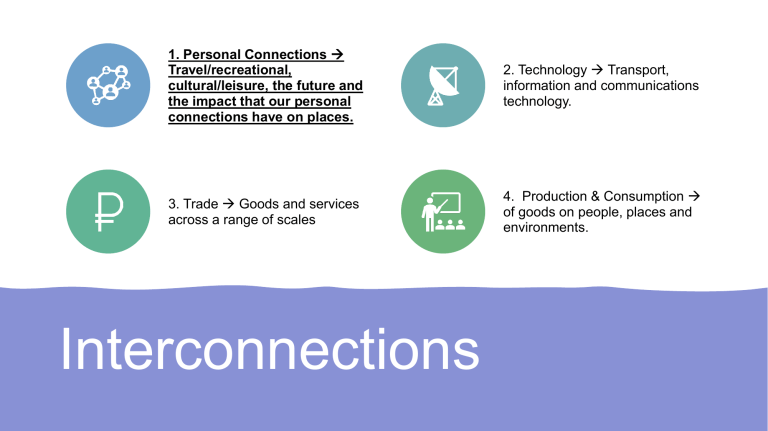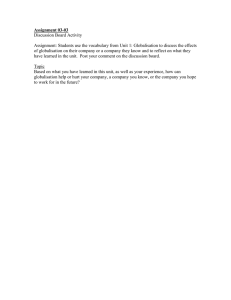
1. Personal Connections Travel/recreational, cultural/leisure, the future and the impact that our personal connections have on places. 2. Technology Transport, information and communications technology. 3. Trade Goods and services across a range of scales 4. Production & Consumption of goods on people, places and environments. Interconnections Interconnections Interconnections: The relationships between all things and all processes, both natural and human. (copy this definition) Globalisation For this topic, it is important that you understand the process of globalisation. • Have you heard this word before? • What do you think it means? Activity! As a class, we’ll complete the brainstorm in your worksheet. (What do you think when you hear globalisation? Hint: have a look at the logos on this slide). Globalisation • Globalisation is the process of the world and its people becoming more interconnected. This means there are new ‘pathways’ for goods, ideas, money, people and services to flow around the world. • It is due to advancements in transport and communications technologies that we can now connect and share information and goods throughout the world. • A good example of the changes in transport might be travel times. From England to Australia 200 years ago it would have taken almost a year on a sailing boat. Today the same distance can be covered in around 24 hours. • This has some very strong positive results, as well as some negative ones. These will be explored in this topic by • How Globalised are you?? 1. Create a word document called “globalised (your name)” Activity time! 2. Find an outline picture of a person and paste it into your document. 3. Make notes using text boxes to show how you are connected to other countries. Find photographs on the internet to show this. * Use example on your worksheet for inspo. Assimilation A situation whereby one group slowly takes on the cultural norms of another e.g. immigrants to their host nation. Commodity Any raw material that can be exchanged e.g. oil, wheat etc. Consumer A person who buys goods or services. Fossil fuel Energy derived from the remains of organisms e.g. coal, oil, gas etc. Free trade An agreement which allows trade between nations free of any border restrictions. Globalisation A process where trade, migration and communication that used to be on a local or national scale move to include the whole world. It is occurring due to advancements in technology and removal of barriers (political) between countries. Goods and services Products that can be sold. Goods refers to physical, tangible products; services to intangible ones such as shops Gross Domestic Product (GDP) The total economic value of goods and services produced by a nation. Information technology The range of electronic equipment used in modern communications. Interdependence A relationship of mutual need between regions or nations. Linkages Flows of inputs and outputs, usually for companies but could also be settlements, nations etc. Monopoly Where one company or person is the sole supplier of a good or service. Non-renewable resource Fossil fuels (coal and oil) that cannot be replaced. Renewable resource A resource for which there is no practicable limits because it is constantly replaced e.g. solar power. Tariff An amount of money paid to import specific goods. Tourism An activity, undertaken voluntarily for pleasure, that involves staying away overnight. Trade The sale of goods and services. Unemployment A situation where a person does not have employment. Check your understanding *Complete multiple choice questions


